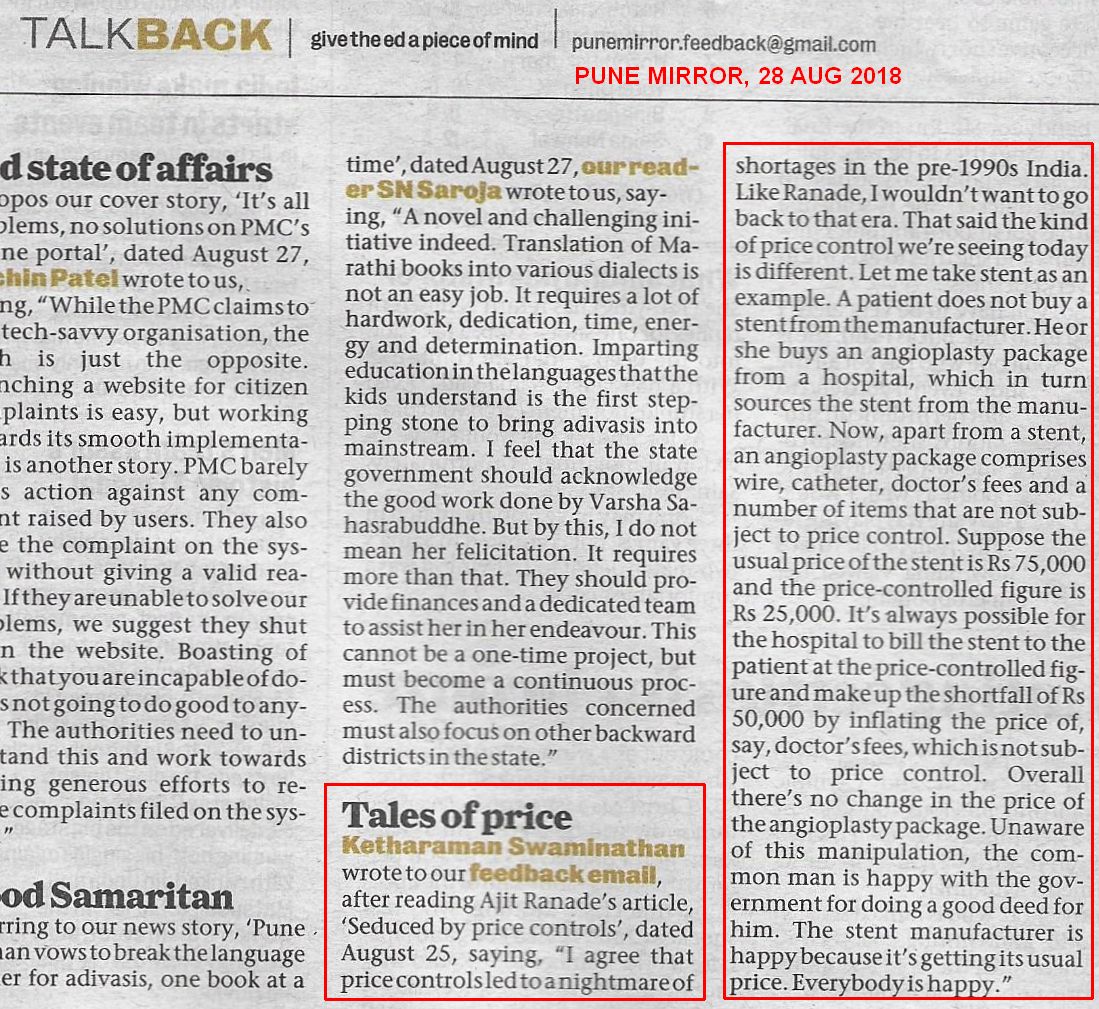Amidst the din of free versus paid vaccine and blackmarketing of essential drugs like Remdesivir, I thought it’s a good time for me to repost my letter to the editor of Times of India on the topic of price control.
From: Ketharaman Swaminathan [s.ketharaman@gtm360.com]
Sent: Sunday, 27 September 2020 7:33 PM
To: ‘sunday.times@timesgroup.com’
Subject: Sunday Mailbox
Dear Editor of Sunday Times:
This has reference to the article entitled “Free market is great but not when a patient’s survival depends on it” published in today’s Sunday Times.
I agree with the author Robin David that a pandemic outbreak like Covid-19 is an emergency situation where the patient / buyer is under duress.
But we should not forget that it’s also a situation that puts the hospital / seller under duress. Hospitals incur higher-than-normal costs for medical equipment, consumables, workforce and other inputs that are under severe shortage during these times. It’s not fair to unilaterally subject the hospital to price control.
In a capitalism, Government has equal responsibility towards private citizens aka patients and corporate citizens aka hospitals.
Patients can’t afford to pay. Hospitals can’t be subject to price control.
If that sounds like a stalemate, it’s only because the author has totally missed the solution available in a free market for this situation: Health Insurance.
As things stand, health insurance is not mandatory in India. A very small fraction of the population has it. Had the majority of the private citizens with savings – the economic strata referenced in the article – purchased health insurance, we wouldn’t be having the present crisis.
It’s not fair for the government to impose price control on corporate citizens in response to an emergency that has been created by the negligence of private citizens.
Instead of price control, I propose the following solution to improve on the status quo regarding healthcare: Mandatory health insurance.
Under the present system of health insurance in India, premium is set by coverage amount. More the premium, more the treatment. Ergo this creates a situation where people with greater financial resources can get shell out more premium to buy costlier insurance and thereby get more treatment. Whereas people with lower financial resources can’t. In other words, treatment depends on bank balance, if health insurance is involved. To me, that sounds okay since Indians get free treatment at government hospitals without paying any health insurance. This is true for both tax payers and non-tax payers.
If it comes across as unfair to the majority, then the government can adopt the “Universal Healthcare” system prevalent in Western Europe, where the premium is set at a percentage of income and the coverage is the same for everyone. The rich pay more premium, the poor pay less premium, but both get the same level of treatment. No longer will human life be measured by bank balance.
As an aside and contrary to popular misconception, Europeans don’t get free healthcare in return for income tax but because they pay health insurance premium separately.
Universal Healthcare is widely seen as a system that ensures fairness to both private citizens (i.e. common public) and corporate citizens (i.e. healthcare companies). Going by my personal experience with the system in Germany and UK, I don’t agree: Universal Healthcare leads to rationing of healthcare, long waiting periods for treatment, and, when the $hit hits the fan, exhortations to people not to come into hospitals, as NHS did in UK recently.
But Universal Healthcare is a good starting point for India in the pursuit of improving healthcare for everyone without too much government intervention.
While on the subject, I strongly believe that it’s worth preserving free market principles, even in the healthcare industry. To paraphrase Churchill, “Capitalism is the worst economic system except for all the alternatives”.
Ketharaman Swaminathan
Pune, INDIA
I have first hand experience of public healthcare system in five countries including India. Success Stories and Horror Stories abound everywhere.
While you can find my detailed comparison of the different systems at Comparison Of Healthcare & Health Insurance Across Different Countries, here’s the tl;dr:
- Germany: Pay Lot Get Lot
- UK: Pay Little Pray Lot
- USA: Pay Nothing Get Nothing, Pay Lot Get Lot
- India: Pay Nothing Get Something, Pay Lot Get Lot
I have also experienced the public healthcare system in Oman. But it was a while ago. While I’m sure that I did not pay anything when I availed myself of doctor consultations and medicines, I’m not able to recall if my employer deducted health insurance premium from my salary. If any of you readers has more details on how the system works in the Middle East, please share in the comments below.
Price control is not what it’s often touted to be.
Price Control rarely works but often manages to hoodwink gullible public. All regimes resort to it at some point or the other e.g. 25K Stent & 3.5K Remdesivir Price Control by current govt.
But same strategy won't work for Vaccine.— Ketharaman Swaminathan (@s_ketharaman) May 17, 2021
Stent Price Control
Remdesivir Price Control
On 2nd thoughts, this may NOT be Price Control at all. I just noticed 1-4X range in "Revised MRP", which, AFAIK, is impossible under price control, where govt stipulates one price for all cos à la Stent @ INR 25K a few years ago.
cc: @ProsaicView Thoughts? pic.twitter.com/RsB5WMncVl— Ketharaman Swaminathan (@s_ketharaman) May 6, 2021

